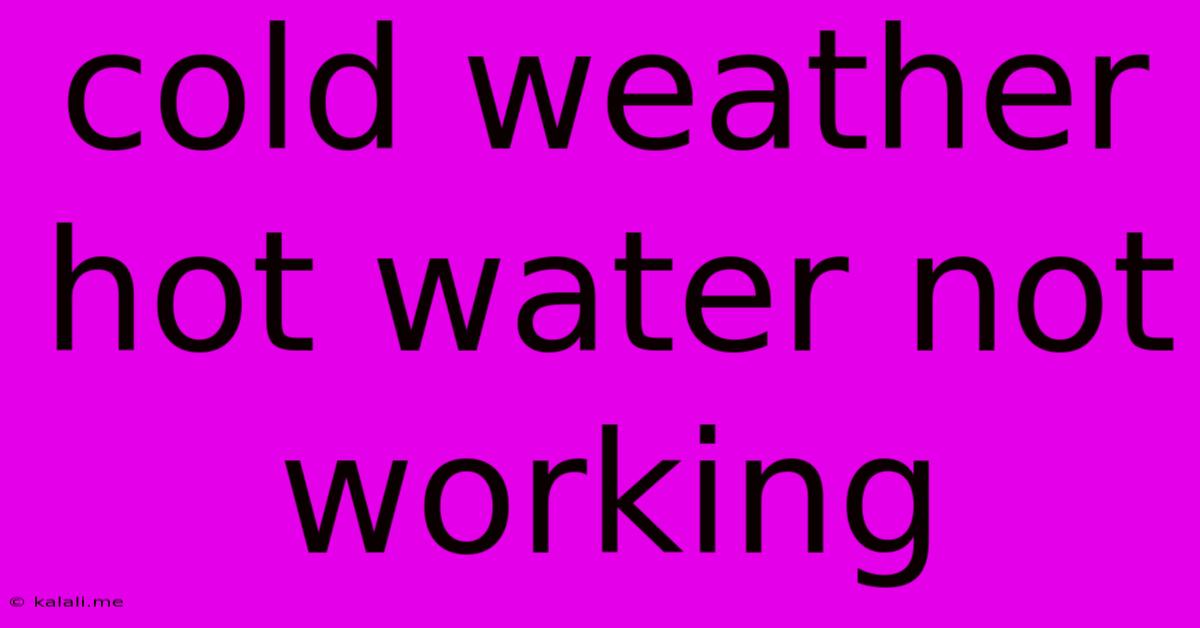Cold Weather Hot Water Not Working
Kalali
May 24, 2025 · 3 min read

Table of Contents
Cold Weather Hot Water Not Working: Troubleshooting Your Frozen Pipes
A sudden plunge in temperature can lead to a frustrating problem: no hot water. While a simple malfunction might be the culprit, cold weather often plays a significant role in hot water woes. This guide will walk you through troubleshooting your hot water issues when the mercury dips below freezing, helping you identify the problem and find a solution. This could range from a simple fix to a more serious plumbing issue requiring professional help.
Why Cold Weather Affects Hot Water
The most common reason for hot water failure in cold weather is frozen pipes. Water expands as it freezes, putting immense pressure on pipes. This pressure can cause pipes to burst, leading to leaks, no hot water, and significant water damage. Even if a pipe hasn't burst, the ice blockage prevents water from flowing to your hot water heater and then to your faucets. Other less frequent causes might include a malfunctioning water heater, issues with your gas or electric supply to the heater, or problems within your plumbing system itself.
Troubleshooting Steps:
Before calling a plumber, try these steps:
1. Check Your Water Heater:
- Pilot Light (Gas Water Heater): If you have a gas water heater, ensure the pilot light is lit. A simple re-ignition might solve the issue. If you're unsure how to relight your pilot light, consult your water heater's manual or search online for instructions specific to your model.
- Power Supply (Electric Water Heater): For electric water heaters, check the circuit breaker or fuse box to ensure power is not interrupted. A tripped breaker is a common cause of hot water failure.
- Temperature Settings: Verify the thermostat on your water heater is set to a desired temperature.
2. Locate and Check for Frozen Pipes:
This is the most likely culprit in cold weather. Focus on exposed pipes, particularly those in uninsulated areas like basements, crawl spaces, attics, or exterior walls.
- Signs of Frozen Pipes: Look for bulges or discoloration in the pipes. Feel the pipes; frozen pipes will feel hard and cold to the touch. Listen for unusual gurgling sounds.
- Common Frozen Pipe Locations: Pipes leading to exterior faucets, in unheated garages or sheds, and near outside walls are highly susceptible.
3. Thaw Frozen Pipes (If Applicable):
Caution: Never use a blowtorch or other open flame to thaw pipes; this poses a significant fire risk.
Here are safer thawing methods:
- Hair Dryer: Apply low heat to the frozen section, moving the dryer slowly to avoid overheating the pipe.
- Space Heater: If the frozen section is accessible, position a space heater nearby, directing the warm air towards the frozen pipe. Keep a close eye on the temperature to prevent overheating.
- Warm Towels: Wrap warm, wet towels around the frozen section of pipe.
Important Note: Once you've thawed the pipes, allow the water to flow slowly to ensure all ice has melted and no further blockages exist.
4. Investigate Other Plumbing Issues:
If your pipes aren't frozen, the problem might lie elsewhere within your plumbing system. This could include:
- Sediment Buildup: Over time, sediment can accumulate in your hot water heater, reducing efficiency. Flushing the tank might be necessary.
- Faulty Valves: Check all valves leading to and from your hot water heater to ensure they are fully open and functioning correctly.
- Leaks: Check for leaks throughout your plumbing system. Even small leaks can affect water pressure and hot water delivery.
When to Call a Plumber:
If you’re unable to identify the problem after trying these troubleshooting steps, or if you suspect a burst pipe, call a qualified plumber immediately. A burst pipe can lead to extensive water damage, making prompt professional intervention essential.
By systematically investigating these areas, you can significantly improve your chances of restoring your hot water supply quickly and effectively, even during the coldest of winters. Remember, prevention is key – insulating exposed pipes can help prevent freezing in the future.
Latest Posts
Latest Posts
-
How Long Does Gasoline Last In A Can
May 24, 2025
-
Can You Speak Without A Tongue
May 24, 2025
-
Why Is The Moon Orange Tonight 2024
May 24, 2025
-
Check Oil With Car On Or Off
May 24, 2025
-
How To Clean Blood Out Of Carpet
May 24, 2025
Related Post
Thank you for visiting our website which covers about Cold Weather Hot Water Not Working . We hope the information provided has been useful to you. Feel free to contact us if you have any questions or need further assistance. See you next time and don't miss to bookmark.